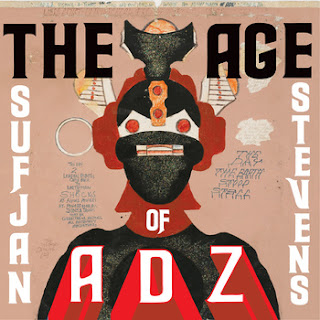The views expressed in these blogs do not represent the views of The Independent, Its staff, Its advertisers, or Clark College.
Friday, February 11, 2011
Tuesday, February 1, 2011
The Age of Adz
Radiohead is one of my favorite bands. They're pretty much the best. Their sound is the most willfully self-indulgent brand of electro-folk rock, but they skirt insufferable somehow (other artists that do this: Broken Bells, Gnarls Barkley, Gorillaz.)
Sufjan Stevens is just about there. Not quite. I think some of his lyrics are shallow, and this is a genre that picks stale lyrics out and displays them for the world to see. The essential test of whether your electronic rock song is awful is how ridiculous your lyrics would sound if you weren't crooning them into a microphone while a synthesizer seizures behind you. Stevens gets it about 95% right in last year's The Age of Adz EP.
The first obvious thing about the album: he likes long songs. Seven of the albums eleven tracks lumber on for more than five minutes. The big finale, nearly an album to itself, with uncountable change-ups, crescendos and denouments, lasts nearly a half hour.
I've heard comparisons to Kid A, Radiohead's signature 90s avant-garde electronic album. It's not that good. Sometimes Stevens' sound drifts away from serene and otherworldly and dangerously close to mundane and washed out, especially during some of the longer tracks. His lyrics are hit-and-miss. Sometimes it sounds like he's covering up some of the repetitive and simple writing with effects, which is annoying.
With that said, "The Age of Adz" does have one thing in common with "Kid A." There are moments of transcendent beauty in this record. When I first heard Vesuvius, the ice-breaker to the digital spiral of the last third of the album, I fell in love. It's a gorgeous sound. The rough spots in this album could be attributed to Stevens' putting out an equally sized EP, "All Delighted People," not three months separate from this.
Unfortunately, mounting evidence suggests Sufjan Stevens might be a hipster jerk, but he's a bold hipster jerk, and his album is worth listening to.
Sufjan Stevens is just about there. Not quite. I think some of his lyrics are shallow, and this is a genre that picks stale lyrics out and displays them for the world to see. The essential test of whether your electronic rock song is awful is how ridiculous your lyrics would sound if you weren't crooning them into a microphone while a synthesizer seizures behind you. Stevens gets it about 95% right in last year's The Age of Adz EP.
I don't get it either.
The first obvious thing about the album: he likes long songs. Seven of the albums eleven tracks lumber on for more than five minutes. The big finale, nearly an album to itself, with uncountable change-ups, crescendos and denouments, lasts nearly a half hour.
I've heard comparisons to Kid A, Radiohead's signature 90s avant-garde electronic album. It's not that good. Sometimes Stevens' sound drifts away from serene and otherworldly and dangerously close to mundane and washed out, especially during some of the longer tracks. His lyrics are hit-and-miss. Sometimes it sounds like he's covering up some of the repetitive and simple writing with effects, which is annoying.
With that said, "The Age of Adz" does have one thing in common with "Kid A." There are moments of transcendent beauty in this record. When I first heard Vesuvius, the ice-breaker to the digital spiral of the last third of the album, I fell in love. It's a gorgeous sound. The rough spots in this album could be attributed to Stevens' putting out an equally sized EP, "All Delighted People," not three months separate from this.
Unfortunately, mounting evidence suggests Sufjan Stevens might be a hipster jerk, but he's a bold hipster jerk, and his album is worth listening to.
Subscribe to:
Comments (Atom)

